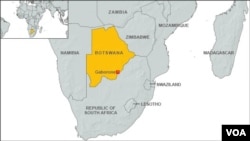Following public outrage, Botswana’s government has revised a controversial spy bill which would have allowed investigators to intercept private communications without a court order.
Under the revised bill, tapping private conversations now becomes an offense.
Botswana’s government removed controversial clauses in the Criminal Procedure and Evidence Bill, presented to parliament last month. The initial bill allowed investigators to bug communication devices and gave state agents immunity from prosecution.
In that version of the bill, there was no oversight body and investigating officers were also allowed to assume fake identities.
But on Friday, the government introduced a revised bill to parliament that will now make it an offense to tap conversations. An oversight body will be established under the control of the minister.
Opposition member of parliament Dithapelo Keorapetse welcomes the changes but still has concerns about the proposed law.
“What the state sought to do through this law, in its original form as it was gazette, tabled, read for the first time and second time, was to legitimize state terrorism," said Keorapetse. "That is what we opposed.”
He says pressure from civic society groups led to the government removing what he calls the offending clauses of the bill.
“We are not ashamed to say that we would like to extend our sincere gratitude to the civic society, including the Law Society of Botswana, the media, trade unions, opposition, influencers and Batswana in general for their strong voice and campaigns against the bill," said Keorapetse.
Cindy Kelemi, the director of the Botswana Network on Ethics, Law and HIV/AIDS, says there is still need for more debate on the bill.
“Our expectation is that a bill of this nature, which has the potential to infringe on people’s liberties, should have extensive engagements and consultation," said Kelemi.
The Media Institute of Southern Africa wrote to President Mokgweetsi Masisi this week, urging him to halt debate on the bill pending public consultations.
MISA-Zimbabwe chapter’s Nqaba Matshazi says they welcome the new changes to the bill and will continue to engage with Botswana’s government.
“While there are still issues that we are concerned about, I think in everything that the government does and everything that parliament does, there should be a balance between the rights of citizens, particularly the right to privacy in this case and the state’s obligation in terms of national security," said Matshazi.
When debate is finished, the revised bill is expected to pass into law with few changes.




